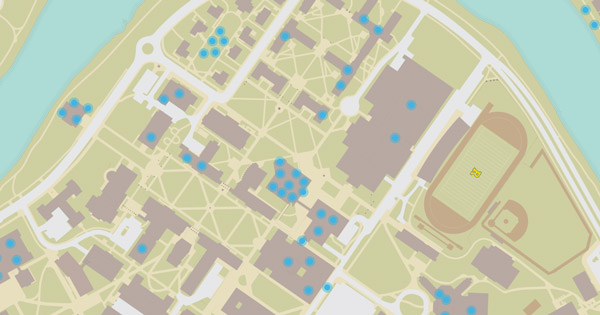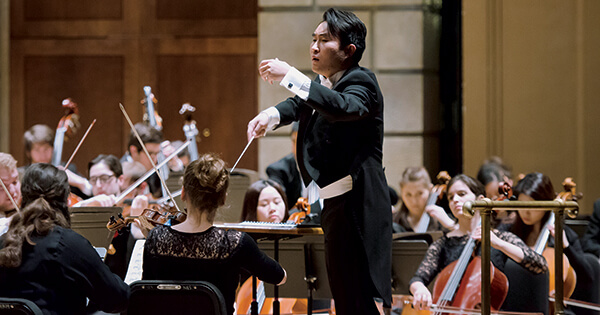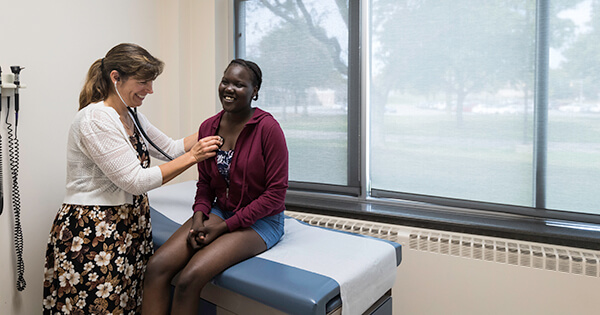Health Care at East High
School of Nursing staffs health care facility at East High
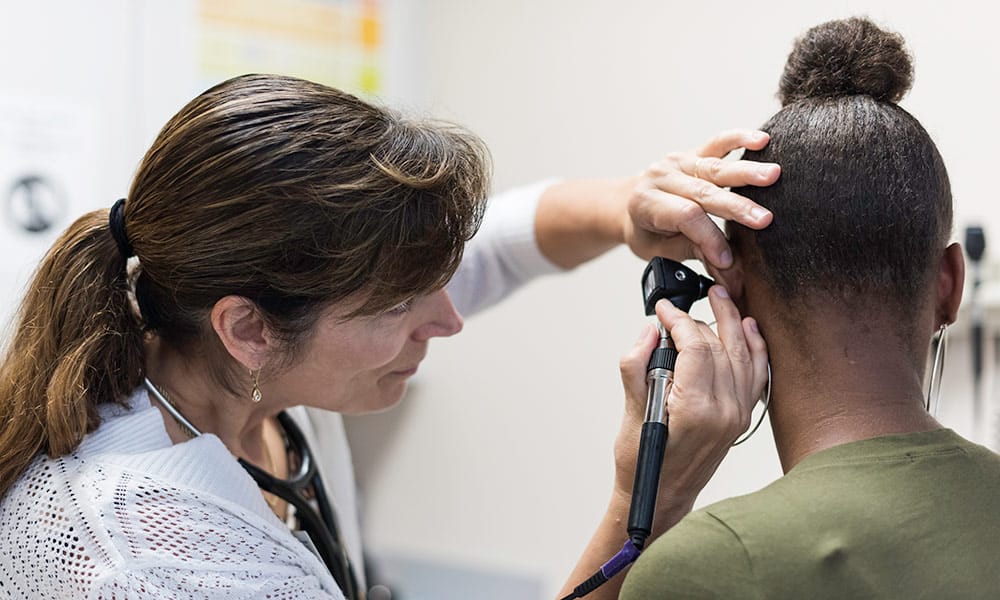
Nurse practitioner Joan Stack examines a student at the University’s Health Center at East High School. (University photo / J. Adam Fenster)
Annan Lamin and La’Niiya Johnson leave their classes, head down an unadorned hallway of muted greens and yellows, and sit among a row of mismatched chairs opposite the entrance of East’s School-Based Health Center. While they wait to see one of the center’s nurse practitioners, another student arrives and takes a seat.
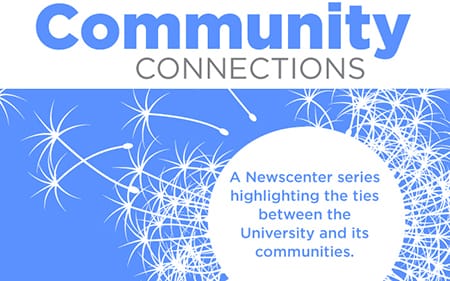 For many students at East, set in one of the poorest school districts in the nation, the barriers they face to getting an education may seem impenetrable. They may lack consistent support at home, or have witnessed violence in their home or community. They may be homeless. But, with a full-service clinic that provides free comprehensive physical and mental health services on-site at their school, getting access to quality health care is significantly less challenging than it might be otherwise.
For many students at East, set in one of the poorest school districts in the nation, the barriers they face to getting an education may seem impenetrable. They may lack consistent support at home, or have witnessed violence in their home or community. They may be homeless. But, with a full-service clinic that provides free comprehensive physical and mental health services on-site at their school, getting access to quality health care is significantly less challenging than it might be otherwise.
Staffed and supported by nurse practitioners from the University of Rochester School of Nursing, the School-Based Health Center at East not only helps students manage chronic conditions such as diabetes and asthma, but diagnoses and treats acute illness and injuries, offers physical and mental health assessments and mental health therapy, provides birth control services, and has an on-site laboratory and medication dispensary. University physicians are also available for collaboration and consultation.
With more comprehensive services than offered by the school nurse, the clinic functions as a satellite primary care office. With parent or guardian permission to enroll in the program, students can visit the clinic at any time for any service. The clinic treats students regardless of their ability to pay or health insurance status, and no out-of-pocket expenses are incurred, while allowing students to stay in school.
“I come here a lot. It’s convenient,” says Lamin.
“Some students do have primary care they access, but it means parents have to miss work,” says Kim Urbach ’98N (MS), director of the school-based health center program and an assistant professor of clinical nursing at Rochester. “It’s not just a benefit for the child. It’s a benefit for the parent and financial stability of the family.”
And that may help students meet their academic goals. Health disparities mirror gaps in educational achievement. But research on school-based health centers shows that they can not only improve health outcomes by reducing emergency visits and hospitalizations, but they may also lead to better attendance and academic outcomes.
In the 2016-17 school year, more than 1,100 students at East were enrolled in the program and made more than 3,100 visits. The most frequent reason for visits to the center—cited in 34 percent of all visits—was mental health or behavioral issues.
The clinic’s psychiatric nurse practitioners can dispense medication, but also are educated in individual and family psychotherapy, which is critical in supporting a population of students who may be experiencing trauma from a recent violent event or the chronic stresses associated with living in poverty.
“The mental health services are incredibly important. The population has experienced a lot of trauma both personally and secondhand,” says Urbach, noting that the clinic uses questionnaires in its physical exams to help uncover signs of potential behavioral concerns. “The physical health services act as a ‘back door’ into the mental health services.”
There are more than 2,300 school-based health clinics across the United States. The center at East, a partnership between the Rochester City School District and the University of Rochester, was established in 1995 with funding from a New York State Department of Health grant. The School of Nursing gets reimbursed for care to students covered under some insurance plans, but because the clinic is a state-funded entity, all surplus revenue is poured right back into it in the form of supplies, equipments upgrades, or the hiring of new staff—though some is used to help support a second University school-based health center at the Frederick Douglass Campus.
“We don’t make any money on this,” says Kathy Rideout ’95W (EdD), dean of the School of Nursing and vice president of the Medical Center. “This is a service we’re providing to keep our kids healthy.”
“The healthier our kids are, the healthier they’ll be as adults. If we are able to maintain not just their physical health, but their mental health, we’re creating the next generation that is going to need to use fewer resources, and enter adulthood more physically and mentally healthy, which makes them more productive citizens. Even at the most basic level, we’re succession planning for the next generation of adults. Many of these individuals are living in abject poverty. They need to have the proper health care so that they can think better, learn more, and really be able to succeed in that kind of environment.”


